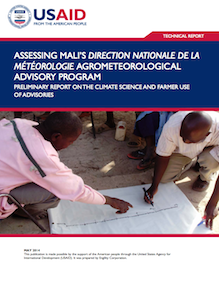Assessing Mali’s Direction Nationale De La Météorologie Agrometeorological Advisory Program: Preliminary Report On The Climate Science And Farmer Use Of Advisories


A recent assessment of Mali’s Direction Nationale de la Météorologie Agrometeorological Advisory Program provides data analysis and recommendations based on the experiences of the farmer climate advisory program aimed at improving food security by increasing crop yields. The endeavor, part of the CCRD project, was commissioned by USAID’s Office of Global Climate Change at the request of neighboring Sahelian countries hoping to build similar programs.
Summary
The report reviews the science behind the assessments and the farmer use of advisories, identifying lessons learned and potential areas of improvement. Mali’s experience highlights the challenges of providing credible, actionable climate information to agriculturalists while reaching the broadest population possible, especially with regard to the activities of women, pastoralists, and poor farmers.
The report will be followed by a second installment that will provide additional qualitative fieldwork to understand the patterns of farmer use of advisories, identify opportunities to reach new parts of the population, and better understand the impact of the program for farmers — including assessing the role of gender in development.
This comprehensive initiative will inform and revolutionize the programming, design, and implementation of climate services for farmers in the Global South.
Main findings
This assessment found that current rates of use by farmers of agrometeorological advisories were generally very low (in most participating villages surveyed use rates were less than 20%). Further, in nearly all parts of southern Mali women’s rate of use of the advisories was lower than that of men, and often there was no participation in the program by women. The reasons for these patterns are many, and appear to be related to farmers’ ability to use the advisories, rather than their trust in the advisories’ guidance. For example, the advisories do not target the crops women grow, limiting the utility of the information and their participation in the program. The low rates of participation among men are likely closely linked to wealth and assets, where those with more wealth and assets are more able to respond toadvisories with regard to variety selection and the timing of agricultural activities, such as planting. Further, some decisions about variety selection are about timing markets, for example to bring in harvests during peak prices, as opposed to climate considerations. It is critical to note, however, that the evidence from this assessment suggests that farmers using the advisories followed them closely with regard to variety selection and timing of planting (two closely related activities). This suggests that, for those farmers able to use them, the advisories are seen as credible and useful.
Climate services design and recommendations
This preliminary assessment of the Agrometeorological Advisory Program points to several general principals that should inform interventions in this program, and the design of future climate services programs:
-
Reliable climate data provides the foundation for any climate service.
-
The design and delivery of effective climate services rests on a foundation of rigorous science and technology for forecasting, but requires substantial attention to social considerations that shape the salience and credibility.
-
Whether users find the information delivered by climate services useful and actionable depends on how that information aligns with the decisions they make. The decision-making behind observed rural livelihoods activities and outcomes is complex and often locally-specific, incorporating economic, environmental, historical, social, and political considerations.
-
Some users are more likely to benefit from climate services than others. This report suggests that a farmer’s access to wealth and assets shapes his or her ability to act on advisories.The wide disparities between men and women’s use of the advisories points to the importance of both understanding livelihoods activities and decisions and enabling the environment for climate services use.
Report prepared by:
United States Agency for International Development, and Climate Change Resilient Development Project (CCRD), managed by Engility Corporation. October 2014.Contributing Authors:Edward R. Carr, University of South Carolina, USATufa Dinku, International Research Institute for Climate and Society, Columbia University, USAAlessandra Giannini, International Research Institute for Climate and Society, Columbia University, USAJohn Kupfer, University of South Carolina, USASimon Mason, International Research Institute for Climate and Society, Columbia University, USAAbdoulaye Moussa, ICRISATContributing Researchers:Anthony Berenguel, Stratus Consulting, Boulder, CO, USANathan Braun, Stratus Consulting, Boulder, CO, USAMichael Duckworth, Stratus Consulting, Boulder, CO, USAFiona Gavin, Stratus Consulting, Boulder, CO, USAThomas Hodgson, Stratus Consulting, Boulder, CO, USATshibangu Kalala, University of South Carolina, USAKwame Owusu-Daaku, University of South Carolina, USAPierre C. Sibiry Traore, International Crops Research Institute for the Semi-Arid Tropics, MaliJoel Smith, Stratus Consulting, Boulder, CO, USAJustin Stein, Stratus Consulting, Boulder, CO, USALassana Toure, Institut d’Economie Rural, MaliKalifa Traore, Institut d’Economie Rural, MaliCarolyn Wagner, Stratus Consulting, Boulder, CO, USA
(0) Comments
There is no content